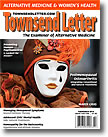|
Encyclopedia of Clinical Anti-Aging Medicine & Regenerative Biomedical Technologies
edited by Ronald Klatz, MD; Robert Goldman, MD; and Catherine Cebula
American Academy of Anti-Aging Medicine; www.worldhealth.net/red-psa
© 2012; 822 pages; $395
The Encyclopedia of Clinical Anti-Aging Medicine & Regenerative Biomedical Technologies is a textbook on anti-aging medicine with contributions by 29 MDs and health scientists. Anti-aging medicine is not just about physical appearance, muscular strength, and sexual vitality, although those are rightful goals for those engaging in it. Anti-aging medicine is preventing the development of diseases of aging – neurodegenerative disease, dementia, cardiovascular disease, cancer, and arthritis. Conventional medicine limits prevention to following a prudent diet, exercise, smoking cessation, sleep hygiene, learning relaxation, moderation of alcohol consumption, application of sunscreen, daily aspirin, and frequent medical screening. As necessary as these interventions are, they fall short of preventing the development of degenerative disease, much less slowing the aging process. The American Academy of Anti-Aging Medicine (A4M), founded in 1992, was established to study and educate on anti-aging medicine and regenerative technologies shown to intervene in the degenerative process and restore youthful vigor. Despite the recent movement by sports authorities to curtail athletes from engaging in "doping" activities to enhance athletic performance, anti-aging medicine holds a legitimate place in medicine. The A4M Encyclopedia reviews the evidence-based medicine supporting medical and regenerative technologies that prevent degenerative disease and restore vitality. The A4M Encyclopedia also provides the A4M Anti-Aging Desk Reference as well as access to 5000 pages of peer-reviewed articles in the A4M Digital Archival Library.
Terry Grossman, MD, borrows from David Letterman and writes about "The Top Ten Life Extension Nutrients and Drugs." What is his number one drug agent for anti-aging? "Metformin." Metformin is considered the first line of medication for diabetes; it is also considered an important agent for metabolic syndrome. Beyond its role in glucose control, metformin plays an important role in lowering cardiovascular risk, preventing cancer, and opposing the aging process. Mark Houston, MD, examines the role of nutraceuticals in the treatment and prevention of hypertension and hypercholesterolemia. How often do we consider advising eating more celery as a diuretic, garlic as a vasodilator, and fish oil as a "calcium channel blocker?" We know about the prudent heart diet for dyslipidemia – Houston would recommend the Mediterranean diet – but how about supplementation with gamma-/delta-tocotrienols, pantethine, probiotics, curcumin, and plant sterols in addition to niacin and red rice yeast?
David Perlmutter, MD, reminds us that inflammation and insulin resistance play a key role in development of neurodegenerative disease. He notes the importance of measuring homocysteine and supplementation of coenzyme Q10 and glutathione. Tim Watt, MD, writes that Lyme disease may be underlying neurologic disorders and must be considered in the diagnostic workup. Watt discusses nonpharmacologic approaches to migraine that must be considered as part of a prevention strategy. He considers the nondrug interventions needed to improve cognitive and neurodegenerative disease. Watt emphasizes that detoxification and reduced exposure to heavy metals and chemicals are critical to preventing brain disease. He also explains that addressing metabolic dysfunction and achieving hormone balance are required to slow down degenerative changes to the brain.
Ron Rothenberg, MD, examines hormone optimization in the aging process. Rothenberg argues that hormone deficiency plays a critical role in aging and that individuals with low normal levels of hormones require treatment. Despite the fact that the medical community worries about hormone therapy's increasing the risk for cancer, Rothenberg would argue that untreated suboptimal hormone levels would increase cancer risk as well. Rothenberg believes that a woman having low levels of estrogen, progesterone, and testosterone definitely requires treatment, as should a man having a low level of testosterone. Further, Rothenberg thinks that all hormones deserve consideration in managing the aging process, including thyroid, cortisol, DHEA, melatonin, and human growth hormone (HGH). Despite most medical boards' naysaying adult treatment with HGH, Rothenberg outlines the evidence for adult growth hormone deficiency and treats patients with it. The A4M Encyclopedia is worth the price just to read Rothenberg's chapter!
Mark Rosenberg, MD, is the director of A4M's Fellowship in Integrative Cancer Therapy; A4M conducts several fellowships in anti-aging medicine credentialed by University of Southern Florida. Rosenberg notes the growing evidence that a ketogenic diet and restriction of calories play an important role in control of cancer. His discussion of cancer pH manipulation therapy presents an important metabolic approach to cancer management. Rosenberg also writes about low-dose metronomic chemotherapy wherein repetitive low doses of chemotherapy are administered – such an approach may be more effective than traditional chemotherapy schedules. Rosenberg's most intriguing discussion is on the role of telomeres in cancer. Telomerase is detected in 90% of all malignancies, making it an important biomarker to predict better or worse outcomes. Strategies that are capable of shutting down tumor cell telomerase activity may be pivotal in arresting cancer.
Nicholas Gonzalez, MD, has been an important physician in the alternative medical community for many years and is a familiar writer for readers of the Townsend Letter. Gonzalez is one of the physicians whose work was examined by the US Congressional Office of Technology Assessment in the 1980s; the OTA report led to the founding of the Office of Complementary and Alternative Medicine at the NIH (now NCCAM). Gonzalez's approach to cancer is based on an individualized dietary program, high-dose pancreatic enzymes, high-dose nutraceutical supplementation, and coffee enemas. Gonzalez's discussion of his treatment approach is a compelling mix of medical theory and history.
Please be prepared to receive a "telephone-directory"-sized reference book that is heavy. The writing is well referenced but, regrettably, is not indexed. For those who are new to anti-aging medicine as well as those whose practice focuses on it, the A4M Encyclopedia is a great reference.


|
|
![]()
![]()
![]()




